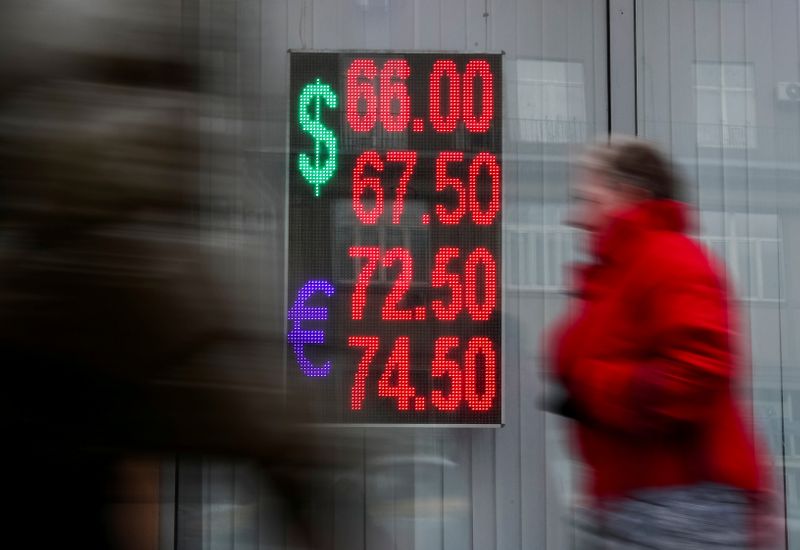By Andrey Ostroukh and Alexander Marrow
MOSCOW (Reuters) - A sharp drop in oil prices and the rouble's fall to a four-year low pose no immediate risks to the Russian budget, but they may hurt already tepid investment activity and thwart President Vladimir Putin's plans to raise living standards in Russia.
Russian assets have taken a hammering since Friday when a deal on cutting global oil output unexpectedly fell apart, sending oil prices, the mainstay of Russia's economy, into a tailspin.
The authorities must also contend with coronavirus, which has dampened global investors' appetite for emerging markets such as Russia. Russia has so far reported 20 confirmed cases of the disease but no deaths.
Sluggish economic growth and falling incomes were a concern in Russia even before Friday. Putin in January reshuffled the government, betting that increased state spending would help.
But Moscow's hopes of economic growth recovering to 2% this year, from 1.3% in 2019, now look overly optimistic.
Vladimir Tikhomirov, chief economist with BCS brokerage, estimates that the Russian economy may even shrink by -0.5% this year and annual inflation could rise to 4.3% by the year-end.
"Consequently, fiscal priorities will change from pro-growth to anti-crisis," Tikhomirov said in a note.
Every sharp rouble drop is painful for households as the weaker currency dents living standards, making imports more costly and raising the overall price level for goods and services.
Alfa Bank, Russia's top private bank, has lowered its real disposable income growth forecast to 1.0-1.5% for this year from 2%, Natalia Orlova, its chief economist, said in a note.
RATE HIKE?
Real disposable incomes, something Putin sees as a priority, grew only marginally in the past two years after falling since 2014.
"There will be no catastrophe, but additional risks are rising," said Oleg Vyugin, a veteran government and central bank official who now heads the Moscow Exchange's supervisory board.
The rouble's drop will fuel inflation, which is "undesirable from a political point of view," while stopping lending rates from declining, "which is bad for banks", Vyugin said.
To address rising inflationary pressure, the central bank - which targets 4% inflation - may now put its monetary easing cycle on hold or reverse it, which is seen limiting economic activity. Inflation currently stands at 2.3%.
"I would not be surprised if the central bank decides to raise rates in the next few days... The situation is becoming extraordinary," said BCS's Tikhomirov.
Having learnt the lessons of 2014, when the impact of falling oil prices was exacerbated by Western economic sanctions against Moscow, Russian authorities have made the economy less vulnerable to external shocks.
In 2020, with $570 billion roubles in reserves and a globally praised budget rule in action, Russia's budget envisages an average oil price of $42.40 per barrel.
The finance ministry said on Monday that Russia could weather oil prices of $25 to $30 per barrel for up to 10 years, while the central bank launched preemptive FX selling to ease pressure on the rouble.

Since 2014, Russia let the rouble float freely and used it as a shield against oil price swings. Lower oil prices pressure the rouble and the weaker rouble helps Russia to receive more funds for selling its oil abroad for dollars.